Events
08 Nov 10 Nov 2019
Symposium
TRANSVERSE TRAJECTORIES.
Speculative routes out of ruinous landscapes
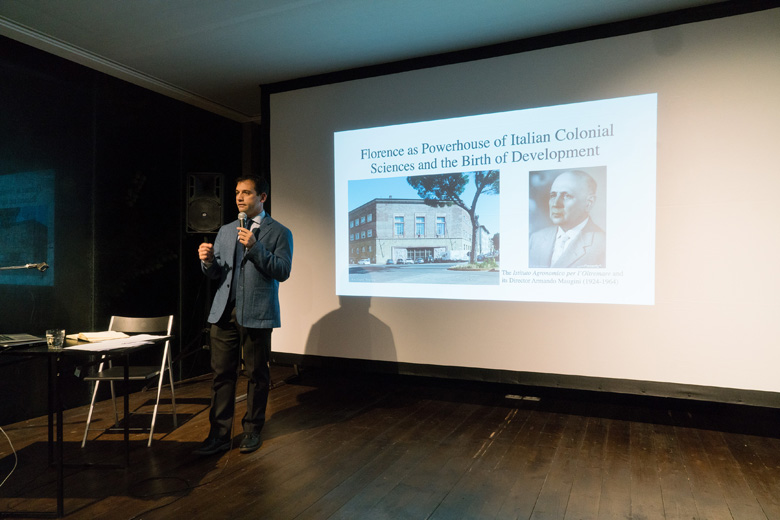
Angelo Caglioti

Åsa Sonjasdotter
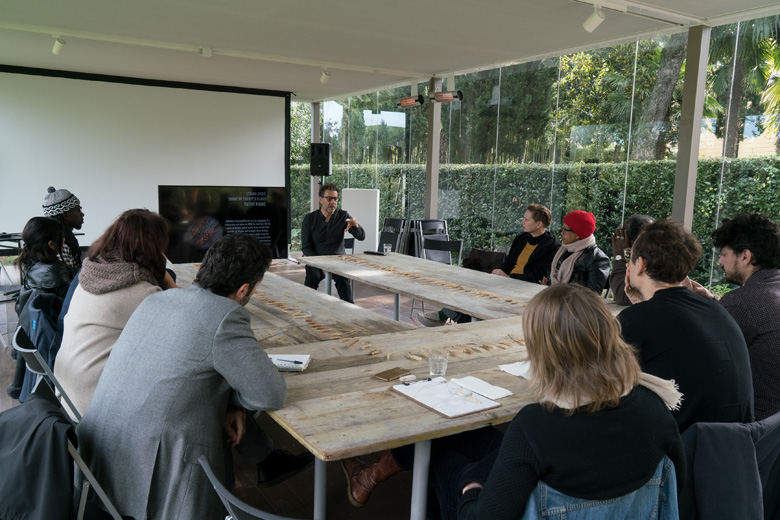
Luigi Coppola
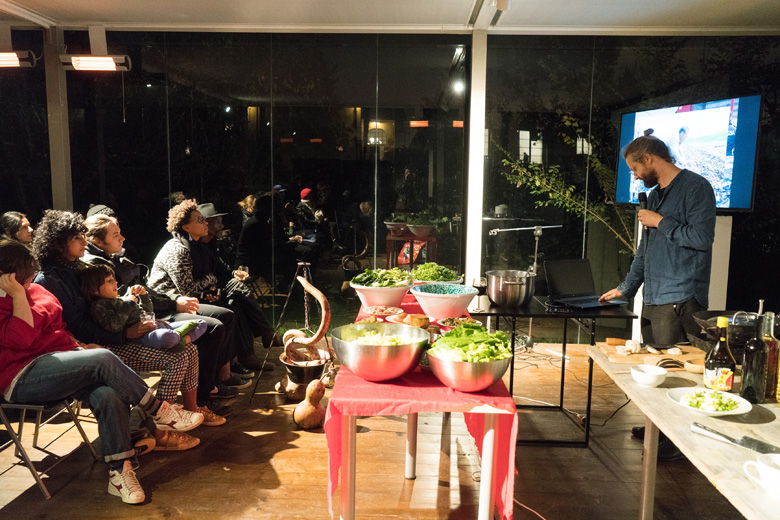
Leone Contini
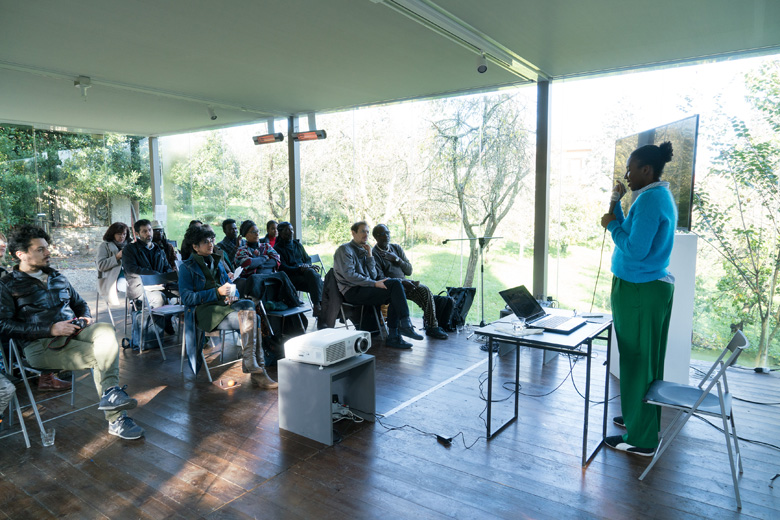
Alafuro Sikoki
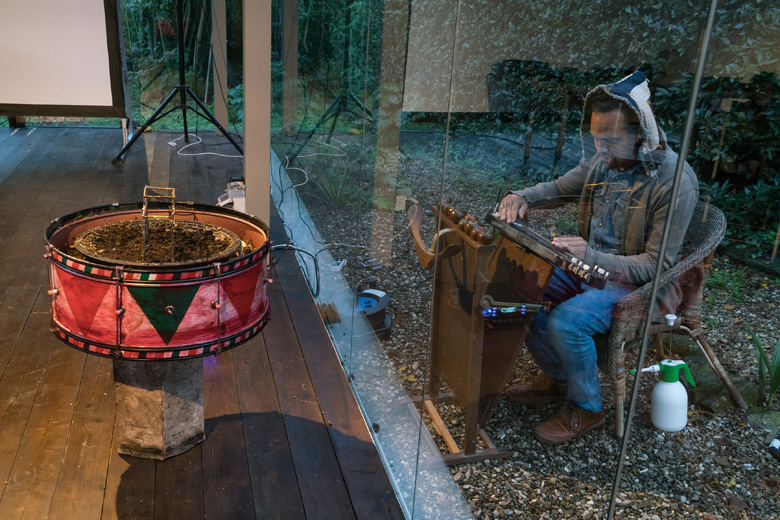
Justin Randolph Thompson
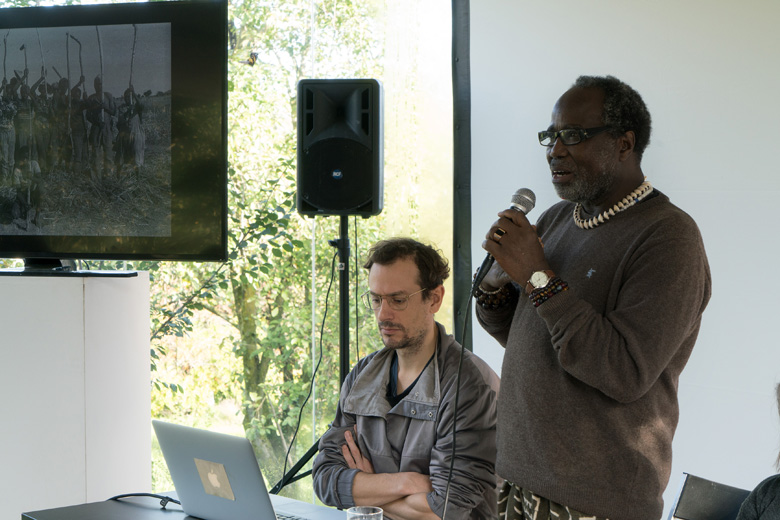
Raphaël Grisey, Bouba Touré
photos: Eva Sauer
The symposium TRANSVERSE TRAJECTORIES: Speculative routes out of ruinous landscapes will deal with the ruined landscapes of the so-called peripheries, with rural areas as silent witnesses of capitalist (neo)-colonial practices and their mobilization of raw materials, goods and people.
Colonial methods of monoculture, plantation economies, standardisation and labour migration are still present in the Global South and cause serious ecological damage in the form of erosion, pollution, contaminated soils and the disappearance of biodiversity. Whole regions, and individual gardens, can be understood as archives of international relations by looking at the structure of their surfaces, their vegetation, the micro-organisms living in the soil, and the soil’s nutrient profile. Paradoxically, through absences they embody stories of intercultural contact and the associated uprooting of plants and humans. Concurrently, however, in some of them the seeds of resistance, in forms of traditional medicinal and poisonous plants, of fruits of subsistence farming and the nurturing of many plant species culturally specific to the place, are germinating.
The lectures and performances of the symposium TRANSVERSE TRAJECTORIES will lead to Italy, Cameroon, Mali, Nigeria and Sweden. They propagate a change of direction and combine anti-colonial with agro-ecological aspects in order to write new stories for contaminated landscapes. They analyse alternative historical pathways, new relationship structures and liberate translocal movements from the one-sided appropriation of the concept of migration.
The symposium accompanies the opening of the exhibition SEEDS FOR FUTURE MEMORIES - Part 4 /an excerpt.
All lectures and performances will be held in English.
Programme
Friday, 08 November
5.30 pm
Introduction
5.45 pm
Keynote Lecture
Climates of Empire. Representation, Science, and European Environmental Colonialism
Dr Angelo M. Caglioti, Rome Prize Fellow at the American Academy in Rome, Rome
In his introductory keynote lecture, the historian Angelo M. Caglioti will introduce a broad overview of the relationship between science, art and European environmental colonialism. His research focuses on the intersection between the environmental sciences, in particular colonial meteorology, and the political ambitions of European imperialism. He is particularly interested in the removal of colonialism from public memory in Italy.
7 pm
Lecture Performance
Peace With the Earth: tracing agricultural memory, refiguring practice
Åsa Sonjasdotter, artist, Berlin /Island of Ven, SE
In her upcoming publication Peace With the Earth, Åsa Sonjasdotter’s artistic research culminates in a network of multiple individual, intertwined narratives about the disappearance and emergence of plant varieties. Those plant-stories are ranging from historical forms of cultivation and the role of women in ecological protests, to the rich variety of vegetables in 18th century kitchen gardens as a subversive form of biodiversity free from state regulation.
8 pm
Opening of the exhibition Seeds For Future Memories - Part 4 /an extract
Introduction with Negger Dou Tamba, musician and activist, Tambacounda
9 pm
Concert
Negger Dou Tamba
Saturday, 09 November
11 am
in Prato
Giardini di Prossimità, Via Nenni Pietro, 1 (RSVP office@villaromana.org)
shuttle from Villa Romana at 10 am
Workshop
Evolutionary Garden as a place of coexistence and cultural germination
Luigi Coppola, artist, Lecce /Brussels
In his workshop, the artist Luigi Coppola will present the practice of Evolutionary Populations, a method of sowing mixtures of different seed varieties coming from different geographical regions of the world. This method of cultivation leaves it to the earth to select the varieties to be cultivated according to the local climate and the soil conditions. An agricultural decision that is also a metaphor for welcoming diversity without prejudice and calls into question the misconception of indigenous (autochthonous) species by spreading seeds of a new and ever-changing culture.
4.30 pm
Sound-Performance
Quattro su Dieci
Justin Randolph Thompson, artist, Florence
Quattro su Dieci is a sound-based performance addressing the nationalistic framing of tomatoes throughout the modern history of Italy, the act of commemorative naming as a disservice and the timeless legacy of Paul Robeson’s activism. The work uses statistics as a meditation on systems of exclusion and employs percussive maintenance for the dispersion of seeds.
5 pm
Lecture
Roots and routes of migration. Narratives and social representations of the "Senegalese migrant" toward Europe
Dr Stefano degli Uberti, anthropologist, Consiglio Nazionale delle Ricerche, Rome
The anthropologist Stefano degli Uberti investigates the concept of migration from a perspective of mobility. Degli Uberti also examines the perception and representation of Europe in Senegal over the past decades, the complex motivations to leave the country, and the role and meaning of the concept of the migrant in Senegalese society.
6 pm
Lecture
SYNTHETIC VERNACULAR, african fabbers at work
Cascone+Laddaga/CODESIGNLAB, architects, London
Founded ten years ago by CODESIGNLAB as a response to the lack of design and architecture schools in Africa, the African Fabbers School is an innovative educational project that combines research and design, technological innovation and traditional culture, transcending the rhetoric typical for humanitarian initiatives and development projects. With African Fabber School the designers are searching for a sustainable speculative future in the past, merging local knowledge systems with new technologies e.g. 3D-printing. This approach is less about nostalgia or the competition of epistemologies than about a critical reweaving of roots based on friction and mediation.
7 pm
Food performance lecture
Toskanische Reise
Leone Contini, artist, Florence
The inventory of vegetable variations on Leone Contini´s culinary journey through Tuscany is quite extensive, thanks to the revitalisation of agriculture by the multitude of Chinese migrants in Prato. While populists see Chinese seeds as a threat to Italian identity, Contini celebrates new traditions of merging (vegetable) cultures in his fusion cuisine and appreciates the decoupling of a rigid concept of belonging from power hierarchies. The performance will be followed by a dinner.
Sunday, 10 November
10 am
Lecture
H++, if design is the answer, then what is the question?
Alafuro Sikoki-Coleman, designer, Belgrade
The creeks and waterways of Bayelsa State have been taken over by water hyacinths, causing an ecological and economic crisis making it difficult for the boats and canoes to move which effects the rural farming and fishing population. Located in the heart of the oil and gas-rich Niger delta, oil pollution and gas flaring pose a threat to the biodiversity of the region. In her long-term project H++ Alafuro Sikoki-Coleman uses the potential of the almost infinite availability of the hyacinth and transforms it into a raw material for alternative ecological and economical visions of the future.
11 am
Presentation
Figuring Fallow Time – Sowing Somankidi Coura, a Generative Archive
Bouba Touré, Somankidi Coura, Paris, and Raphaël Grisey, artist, Berlin
Bouba Touré co-founded the agricultural cooperative of Somankidi Coura (Mali) in 1976, together with other African migrants living in France at the time. Against the backdrop of African liberation struggles and 1968 labour politics in France, the cooperative started as a matter of survival following a drought in 1973. Bouba Touré and Raphaël Grisey will share the cooperative’s history and will address how alternatives for permanent agricultural, economic and pedagogical structures have been sought at Somankidi Coura.
12 pm
Closing Performance
Ke Peo Setlhare le Leung
Lerato Shadi, artist, Berlin
Lerato Shadi´s work centres on the body and its actions. She uses her work to challenge the narrative of a Eurocentric lens as universal.
Curated by Agnes Stillger, Villa Romana
Contributors
Angelo Matteo Caglioti is currently a Rome Prize Fellow in Modern Italian Studies at the American Academy in Rome and will be joining Barnard College, Columbia University, as Assistant Professor in 2020. He studied Contemporary History for his Laurea Specialistica at the University of Padova and received his PhD at the University of California, Berkeley, in 2017 in Modern European History and History of Science. Before joining the History Department at Barnard, he was a Max Weber Fellow at the European University Institute, Florence, a lecturer at Berkeley, and a Fellow at the Rachel Carson Center in Environment and Society at Ludwig-Maximilians-Universität, Munich. His research interests include the history of nationalism and fascism, European colonialism, environmental history, and the history of science. He is the author of Race, Statistics, and Italian Eugenics (European History Quarterly, 2017) and co-editor with Martin Mahony (University of East Anglia) of the special issue Relocating Meteorology of the journal History of Meteorology (2017).
Cascone+Laddaga /CODESIGNLAB: Paolo Cascone was born in Italy in 1976 and grew up in the West Indies and in East Africa. He started his research at the intersection of urban ecologies, digital fabrication and self-construction during his studies at the AA School in London and pursued this path by accomplishing a PhD in environmental engineering in Rome. Paolo has started teaching ecological design at Malaquais and ESA schools of architecture in Paris where he founded CODESIGNLAB. His work has been exhibited widely and published in international design magazines. Paolo is the scientific director of the African Fabbers School and more recently, he has been appointed senior lecturer in environmental and architectural design at the University of Westminster. Maddalena Laddaga graduated in architecture at the Bari Polytechnic. She has developed research projects on traditional architecture in India and has been collaborating with international firms based in Rome and Berlin. During the last years, she has developed applied researches in the field of digital fabrication related to architecture. More recently she has joined CODESIGNLAB as project manager co-directing the African Fabbers project.
Leone Contini (born 1976 in Florence) studied philosophy and cultural anthropology at the Università degli Studi di Siena. His research focuses on intercultural friction, conflict and power relations, expulsion, migration and diaspora and uses the tools of anthropology to short-circuit the spheres of commonness through lecture performances, collective interventions in public space, textual and visual narratives, blogs or self-publishing. Contini has exhibited or held interventions at SAVVY Contemporary, Berlin, ACUD, Berlin (2019), Manifesta 12, Palermo (2018), Museo della Civiltà, Rome (2017), Mudec, Milan (2017), Quadriennale, Rome (2016), Delfina Foundation, London (2014, 2015 and 2017), Khoj, New Delhi (2014), Kunstraum, Munich, D (2014), Kunstverein, Amsterdam (2013) and others.
Luigi Coppola is an artist, activist and promoter of participative projects and politically motivated actions. His artistic practice is connected with the process of social re-appropriation of the commons. He trained both as a scientist as well as in the field of art. Luigi is involved with Casa delle Agriculture, a project in Castiglione d’Otranto, Southern Italy, which seeks to revive abandoned land, repopulate the countryside, generate a sustainable economy and strengthen community cohesion. Additionally, Luigi is the co-director of the Green Night festival, which combines agro-ecological learning with artistic strategies and builds upon the participatory dynamics of the community of migrants, farmers and activists. He has developed projects, performances, installations and exhibitions in international contexts, including the Fondazione Merz, Turin, IT (2018), BAK Utrecht, NL (2018), Kunsthaus Graz, AT (2017), Quadriennale di Roma (2017), Kumu Art Museum, Tallinn (2017).
Raphaël Grisey, born in Paris in 1979, lives and works in Berlin and Trondheim, NO. Grisey uses video, editorial and photographic works to gather or produce narratives about the politics of memory, migration and architecture. In his publication Where is Rosa L. (2001 - 2006) and the film National Motives (2011) he studies the ghosts of various political regimes in the public spaces of Berlin and Budapest. Through diverse documentary, fictional or essayist forms, Grisey’s films and works deal with contemporary societal and political issues such as migration and neo-colonialism. His work has been shown on various film festivals such as Hotdocs Vancouver, CA, Doc Lisboa, Berlinale Forum Expanded, as well as in art centers including Kunsthalle Budapest, Centre Pompidou, Paris, Art Center Les Églises Chelles, F, MAM São Paulo, MCA Chicago, US, Archive Kabinett, D, amongst others. His ongoing artistic research, Sowing Somankidi Coura – a Generative Archive, was exhibited at the Kunsthall Trondheim, No, Den Fries Copenhagen, Contour Biennale Mechelen, BE, Kàddu Yaraax Theatre Forum Festival, SN and Laboratoire d’Aubervilliers, France, amongst others.
Lerato Shadi lives and works in Berlin. Her artistic practice explores problematic assumptions projected onto the black female body and how performance, video and installation can create a space to engage with those preconceived notions, making the body both visible and invisible. Shadi questions how the white cube (the gallery and the museum) can be a symbol for spaces of exclusion. How does the location and architecture affect the body that is performing in it? Why is it important to center, not just include - the marginalized body as a main figure of narrating experience?
Alafuro Sikoki-Coleman (Nigeria /UK) is an artist and industrial designer. Her work is mostly associated with the environment, cultural artefacts, gender roles and connectivity between the object, the user and the environment. Sikoki-Coleman is the founder of Studio Sikoki, research facility for design and art.
Åsa Sonjasdotter is an artist born in Helsingborg, Sweden, in 1966. She lives on the island of Ven, Southern Sweden, and in Berlin. Her artistic work focuses on the politics of plant breeding and processes of coexistence through the cultivation of plants, their images and stories. She has been part of several interdisciplinary research and breeding projects, e.g. at Project Art Space, Dublin (2017 - 2020) and Gotland Museum, Visby, SE (2018). She has been working with botanical and natural history archives and collections since many years. Since 2005, she has been investigating the role of plants in colonial and capitalist modern industrialisation through the stories of the potato. She is further a founding member of The Neighbourhood Academy, an urban garden in Berlin.
Justin Randolph Thompson is a new media artist and educator born in Peekskill, NY, in 1979. Thompson is a co-founder of Black History Month Florence. His work questions the implications of cultural relics and the mutability of their veneration within the context of displacement. Broadly collaborative and inherently interdisciplinary, his work relies upon the collective power of creative dialogue. His site-specific works invites contributors from all disciplines who are interested in the dynamics of communities to partake in the creation of installations and sound-based performances by using gestures of labour as rhythmic structures. Thompson has exhibited internationally and has been artist in residence at the Whitney Museum of American Art, New York, Reina Sofia, Sofia and the American Academy in Rome.
Bouba Touré was born in 1948 in Tafacirga near the Senegal River in the former French Sudan that was to become Mali after the independence, and is currently based in Paris, FR, and Somankidi Coura, ML. Touré went to France in 1965 and lived in the migrant worker hostel Foyer Pinel. From 1965 to 1970, he worked in the factory Chausson and took part in the strikes from 1966 to 1969. From 1969, he studied at the University of Vincennes and in Montrouge and worked as a projectionist at the Cinema 14 Juillet Bastille and at the Cinema L’entrepôt, Paris, for more than 35 years. A photographer since the 1970s, Touré has been documenting the lives and struggles of migrant workers’ movements, as well as the foundation of the agricultural cooperative of Somankidi Coura in Mali. Since 2008, this photographic archive about the work has been complemented by video productions. Touré co-founded the ACTAF (Cultural Association of African Workers in France) in 1971 and the Cooperative of Somankidi Coura in 1977 after agricultural internships in Marne and Haute-Marne (FR). He has collaborated with Raphaël Grisey on the projects Cooperative (2008) and Sowing Somankidi Coura, a Generative Archive (from 2015). In 2015, he published the book Notre case est à Saint Denis (Éditions Xérographes).
Stefano degli Uberti holds a PhD in the Anthropology and Epistemology of Complexity (University of Bergamo) and is currently a researcher at CNR-IRPPS. He has lectured in Cultural Anthropology and the Anthropology of Migration at the University of Bologna and taught as guest lecturer at the Maastricht Graduate School of Governance. His research is mainly focusing on the relationship between Italy and Senegal, investigating transnationalism, the nexus between migration and development, migration, asylum and integration policies in host countries, and processes of regional integration. He is the author and co-author of several publications in edited volumes and peer-reviewed journals, e.g. Regions & Cohesion, Urban Anthropology, Cahiers d’Études Africaines, Ethnography and Qualitative Research, Mondi Migranti, La Ricerca Folklorica, Ethnorema.
In cooperation with
With the kind support of


